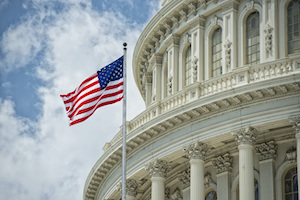
 A bipartisan bill introduced in the U.S. Senate March 30 would make it easier for small businesses to offer retirement plans for their employees.
A bipartisan bill introduced in the U.S. Senate March 30 would make it easier for small businesses to offer retirement plans for their employees.
The Starter-K Act of 2022 (S. 3955) was introduced by Sens. John Barrasso (R-WY) and Tom Carper (D-DE), both of whom sit on the tax-writing Senate Finance Committee. The bill would create starter retirement plans that streamline regulations and lower costs for small businesses and start-ups, resulting in more access to easy retirement savings.
In announcing the legislation, the senators noted that only half of small businesses with fewer than 50 employees currently provide a retirement plan for their employees. Under the bill, employees of participating small businesses are automatically enrolled and would be permitted to save up to $6,000 per year.
“Small businesses are the biggest employers in so many communities in Wyoming and around the country. They deserve the opportunity to provide their employees with better options to save more for retirement,” Barrasso said in a statement. “Our bipartisan bill ensures that small businesses can access streamlined plans without complex regulations. This will help more hard-working Americans save money and achieve a more secure financial future.”
“Small businesses are the backbone of our economy, providing millions of jobs for Americans nationwide. But far too often, businesses cannot afford to provide their workers with retirement plans, leaving many Americans without a sound financial future,” Carper stated. “I’m proud to cosponsor this legislation that would make it simpler and more cost effective for small businesses to provide workers with employer-sponsored retirement plans.”
“The nation’s retirement savings gap is almost exclusively found among small businesses, many of which cite administrative concerns and cost as primary reasons they don’t offer currently access to a retirement savings plan at work,” said Brian Graff, CEO of the American Retirement Association, which supports the legislation. “As they look to meet the challenges of the ‘Great Resignation,’ the ‘Starter K’ provides both a simplified structure and real tax incentives for hundreds of thousands of small businesses to provide for the first time this option to their workforce. We enthusiastically support this legislation, and the opportunity it presents for millions of hard-working Americans.”
Under the legislation, the starter DC plans would be available under Sections 401(k) and 403(b). According to the senators’ summary:
- these plans would streamline regulations by providing employers a safe harbor for the nondiscrimination and top-heavy testing requirements for DC plans;
- employers would not be required to provide matching contributions, meaning lower costs for small businesses and start-ups;
- eligible employers are those who do not currently offer a plan;
- annual contributions would be limited to $6,000, indexed to inflation (with an additional catch-up contribution for those at least age 50);
- eligible employees would be automatically enrolled at a minimum default level of 3% of pay; and
- the Department of Labor is directed to provide simplified reporting for the plans.
The Starter-K Act of 2022 bill comes as the Senate gears up for action on retirement security legislation, following the March 29 approval of the Securing a Strong Retirement Act of 2022 (H.R. 2954)—a.k.a. SECURE Act 2.0—by the House of Representatives by a 414-5 margin. One such provision in the SECURE Act 2.0 to help entice more small businesses to offer a plan is to boost the credit for small employer pension plan startup costs.
- Log in to post comments
